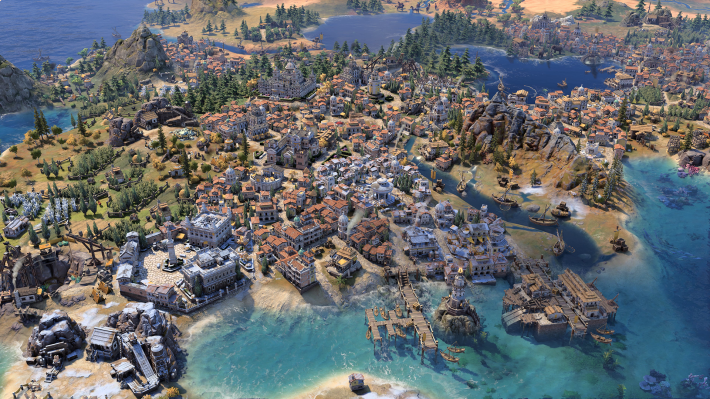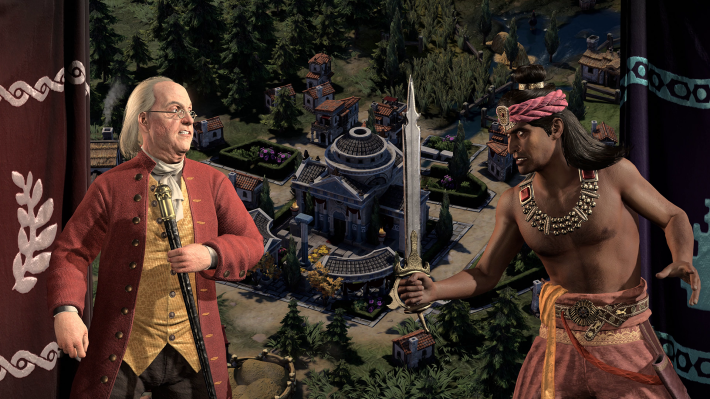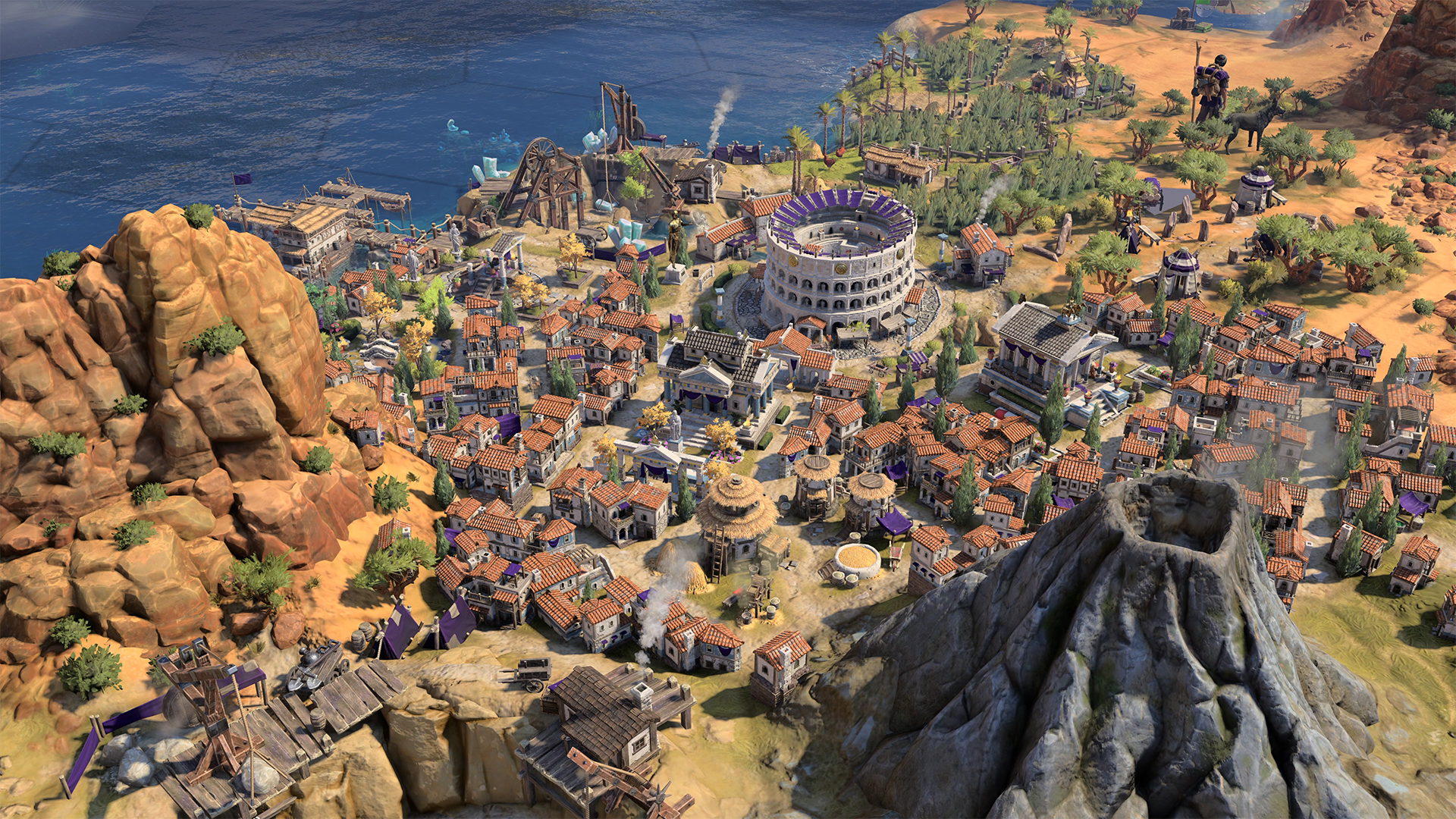The Civilization series has been a load-bearing pillar of the video game industry dating back to 1991, and though the series has gone through many changes throughout its history, the core gameplay has generally stayed the same. Players pick a civilization with an attached leader, then guide it from the early stages of humanity into the near future. It's a tried-and-true formula that has had enough wrinkles to not just thrive for 34 years, but also inspire enough passion in its different iterations to have rabid fanatics of each game. (For my money, Civilization V is the best one, even though I played VI the most.) Civilization VII tries something new, something so fundamentally different that at times it feels like a Civ competitor more than a proper new entry in the series. It shouldn't work, and it often doesn't, but the evolution, really the revolution, that comes with the seventh installment of this long-running series is thrilling even in its flaws.
The biggest change is the most fundamental: This time around, players select any leaders, decoupled from the societies they are historically attached to, and then pick a civilization independently. Now you can make, say, Benjamin Franklin, the head of the Han Dynasty.
The new game is split into three Ages—the Antiquity Age, the Exploration Age, and the Modern Age—and each age transition serves as a soft reset for the game. At the end of the each age, players choose a completely new civilization, chosen from a pool of unlockable options that can become available based on something as basic as historical continuity—for example, if you did play as a Han Chinese Franklin, you are automatically given the option to be the Ming Empire in the Exploration Age—or player actions; if one were to settle around the mountains, then the game opens up the Inca as an option.
With this one change, the game's developer, Firaxis, has upended the narrative structure of its games. No longer can you do ahistorical revisionism; in previous games, you could take a modern society like, well, America, and turn it into an ancient powerhouse starting thousands of years before the American Revolution. Instead, VII attempts to tell a more coherent story of human history in each game. Change, the game says, is constant, and few civilizations last the test of time. Instead, they evolve and change into new peoples, with new strengths, weaknesses, and goals.
When it comes to gameplay, this new change is monumental, and quite jarring. The age transitions, at least on launch, are not elegant. After a certain amount of time, and some end-of-age crises that the player must navigate, such as plague or natural disaster, the game simply swaps ages, skipping ahead anywhere from hundreds of years to thousands. Once in the Exploration Age, to take the first transition as an example, a lot of player progress is simply wiped away. Did you have 50 military units embroiled in a war of conquest as the Antiquity Age ended? Too bad; you now have just one unit per city that you previously built, and all wars have ended. For a game that wants to be cohesive and historical, this lack of resolution and forced downsizing feels terrible.
Elsewhere, the change of civilizations can lead to some cognitive dissonance that I'm not sure is better than the aforementioned "America in the Ancient Era" wonkiness from previous games. By not forcing the player to continue as the historical successor of its first civilization, one can end up playing VII all over the place. Sure, you can take your Han civilization down the path of the Ming, but you can also become the Shawnee from the Americas, or the Norman Empire in Europe. Don't forget that the leader does not change, so Benjamin Franklin goes from leading a Chinese empire to a European one, and the game just trucks along. It's awkward and seemingly antithetical to the game's goals.

And yet, it works anyway! One of the biggest problems with Civilization games over the years is that they stop being fun somewhere near the end-game. By that point, players, especially ones who devote hundreds and thousands of hours to learning all of the systems in order to dominate the hardest difficulties, have become world-conquering behemoths, and the last few hours of a Civilization game can devolve into micro-managing the many cities in an empire while hitting Next Turn over and over. I've finished plenty of Civilization games in my life, but I have probably abandoned just as many as the in-game calendar hits the 1970s, confident that I would win if only I had the patience to play a menu simulator with no challenge whatsoever from the series' often over-matched AI opponents.
Civilization VII and its Age mechanic helps to fix this core problem, with what I would consider wild success. By resetting the player to the bare minimum and giving new goals for victory, each of the game's three Ages feels like a whole new game, for the better. The Exploration Age opens up the deep oceans of the game's world, and unveils a whole other continent, with its own civilizations to meet, treaty with, and/or destroy, and so the beginning of that age flips from a struggle for survival on one continent into a seafaring adventure of, well, exploration. The Modern Age's transition isn't quite as jarring, but the clock begins ticking on a victory, and only some of the player's work in previous Ages contributes toward that victory. This injects the end-game with more urgency than any game in the series before it, and tests the player's infrastructural choices as much as their moment-to-moment decisions.
Put another way, while VII has some narrative issues, the gameplay is as good and impactful as it has ever been. There are still kinks to work out with regards to actually playing the game, but the structure here is promising. The biggest of those kinks is the game's user interface, which is simply put not good enough for a series as storied and accomplished as Civilization. There's less information available at a glance to the player than ever before, though certain aspects of the game were clearly inspired by other games. The game's narrative events, which are random occurrences where the player makes a story choice in order to get different rewards, are seemingly inspired by Crusader Kings, but with a welcome Civilization flavor. On the other hand, the lack of nested tooltips, in which players can get information about certain terms without needing to consult the (not particularly helpful) in-game encyclopedia or the internet, is one of many absences that would make playing VII a more enjoyable experience.

There are also plenty of bugs and glitches in the launch state, an unfortunate consequence of games releasing with the idea that patches aren't just useful but a core part of game development, and I've had struggles playing multiplayer games without the game de-synching and reloading almost every turn. In this way, VII is most like the Civilization games of old: Almost all Civilization games launch in an inferior state before becoming classics with expansions later down the game's life. (Civilization VI, to take the most recent example, was an actual bad game before the developers introduced Dark and Golden Ages in its first expansion, and then climate change disasters in the second). Surely, VII will follow this same path. There are obvious additions that will almost certainly come in expansions, such as a fourth age (the Atomic Age, perhaps?) and a revamping of the actual age transitions themselves to make them less jarring and game-y.
Is it OK to release a game knowing that it will not be truly great until after players drop even more money on expansions, even if the series is known for that development loop? That's a question each player will have to answer, and for every Civilization sicko like me that paid extra to play the game a few days early, there are those who will keep chugging along with the completed VI before picking up VII in a few years, when its many quirks have been ironed out.
As it stands now, though, VII is a big swing toward something new in a series that generally does not evolve this much in one release. To me, the changes are more intriguing than successful, but given that I played about 1,000 hours of Civilization VI over the years, I am ready for something new. VII provides that, for better and for worse, and that's about all I can ask from a game in a series as entrenched as Civilization.






